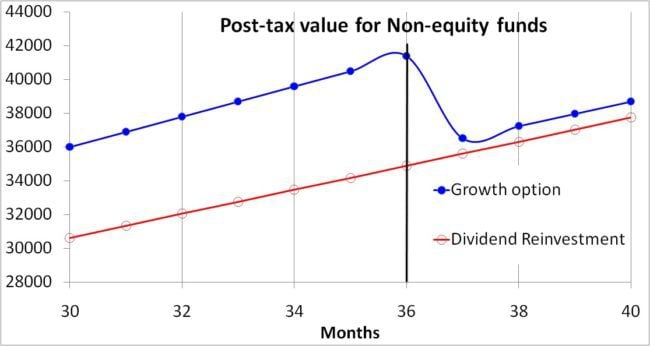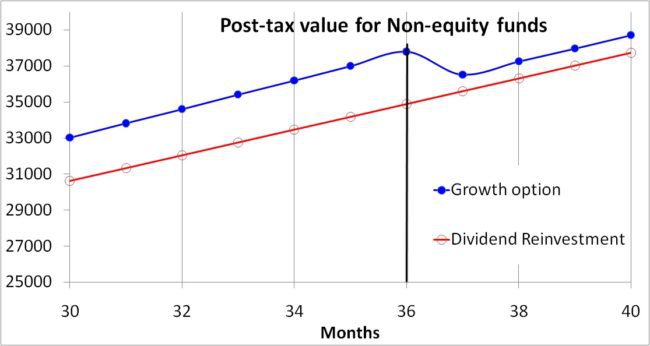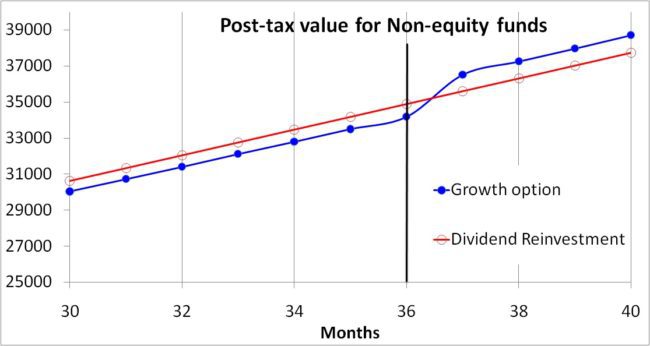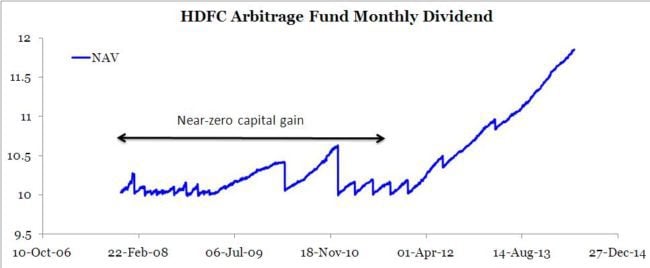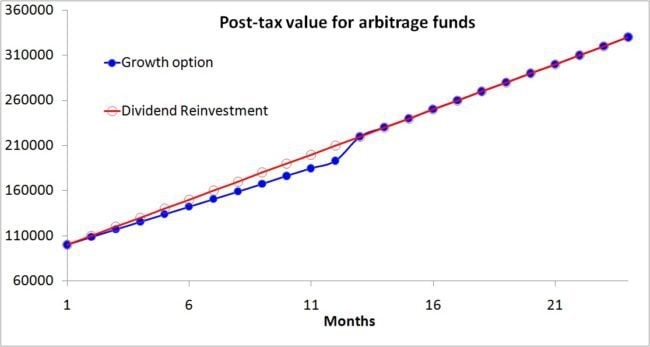Last Updated on January 2, 2016 at 3:54 pm
Here is a simple illustration that will help you understand how growth and dividend-reinvestment mutual funds work. You can use it to decide which is better for you, taking into account the investment duration and your tax-slab.
This is a re-publish taking into account changes made after budget 2014.
When a mutual fund offers regular (typically) dividends on daily/weekly/monthly/quarterly basis, the NAV falls to a base value (Rs. 10/11/12 per unit) or close to it after each dividend.
Only debt or arbitrage mutual funds can afford to do this regularly. Therefore, what follows does not apply to diversified equity funds. Please tag such funds to a financial goal and always use the growth-option.
Join 32,000+ readers and get free money management solutions delivered to your inbox! Subscribe to get posts via email! (Link takes you to our email sign-up form)

🔥Want to create a complete financial plan? Learn goal-based investing? Exclusive access to our DIY tools? Increase your income with your skills? Use this link to enjoy massive discounts on our robo-advisory tool & courses! 🔥
When a debt fund pays a dividend, the fund house will deduct a tax known as dividend distribution tax (DDT)
The current DDT rate = 28.325% (25% + 10% surcharge +3% education cess).
UPDATE: DDT after Budget 2015 = 28.840%
Post-DDT, the investor need not pay any more tax.
If a mutual offers periodic dividends and IF the NAV (post-dividend) falls to a constant base value, there is no capital gain associated with the original investment and dividends that are reinvested (by the fund house on the same day dividend is declared).
That is, the capital gain in a dividend reinvestment option of a mutual fund offering periodic dividends is small if not zero.
Therefore, in such a scheme, the only tax involved is the DDT.
UPDATE: After budget 2014, the duration for short-term capital gains is 36 months for non-equity funds.
Non-equity funds
Short-term Capital Gains (STCG): Had the investment been in a growth scheme and if the amount was redeemed within 3 years, the capital gain would be added to income and taxed as per slab.
For someone in the highest tax bracket, 30.9% tax is more than 28.840% DDT … technically speaking.
So if someone wants to hold a sum for less than 3 years, dividend reinvestment is a better option. Of course, one will have to check if there is any capital gain is incurred upon redemption.
Similarly, if such a person wants to do an STP to an equity over a few months (unnecessary), the dividend reinvestment option is simpler as it minimises (if not avoid) capital gains.
For more than 36 months holding period, capital gains now are are classified are ‘long-term’ and are taxed at a flat rate of 20.6% taking (cost inflation) indexation into account. This is lower tax outgo than the 28.840% DDT. Hence for holding periods more than 3 years, growth option is better irrespective of the tax-slab.
How indexation works:
Indexation means, I ask,
In the financial year of purchase the cost inflation index (CII) was 200 (say). Today, that is in the financial year of redemption the CII is 300 (say). What is my purchase worth today?
This is given by (purchase price x 300)/200 = Indexed Purchase price
(same logic as elementary math: If five people eat 7 samosas, how many samosas will 13 people eat?!)
Here are some illustrations for different tax slabs:
The NAV is assumed to grow at a smooth rate. The dividends are regular (monthly) and the NAV falls to Rs. 10 per unit after each dividend. The cost inflation index is assumed to grow at 8% each year.
The post-tax value for a lump sum investment of Rs. 10,000 is plotted wrt duration in months.
10% tax slab: Growth option is always better (fixed deposits even better!!)
20% tax slab: Growth is always better (fixed deposits perhaps better for short durations!)
30% tax slab: Dividend reinvestment is marginally better if held for 36 months or less.
Equity-oriented funds (arbitrage funds)
In this case, the STCG Holding period is less than 1 year (12 months or less)
Only arbitrage funds in this category can offer reasonably regular dividends. However, the NAV need not fall to a constant base level. There could be, and usually is some growth. So there will be some capital gain.
Have a look at the NAV movement of HDFC Arbitrage fund. Source: Personalfn NAV history
http://www.personalfn.com/tools-and-resources/mutual-funds/nav-history.aspx
For a few years, the NAV fell to Rs. 10 per unit after each dividend (the sharp fall). However, the dividends were never periodic. Recently the NAV has grown with only a couple of small dividends corresponding to a significant capital gain.
For holding periods less than a year, the short-term capital gains tax is 15.450% (15% + 3% cess).
However, there is no DDT!
This means that dividend reinvestment is better, irrespective of tax slab. Some short-term capital gains tax needs to paid, but it should not be as much as the growth option … if there are a few dividends during the holding periods.
For holding periods more than a year, long term capital gains are tax free. Since there is no DDT as well, there is no difference between growth and dividend reinvestment options (apart from rounding off errors), but Growth is better because it is simpler.
For holding periods less than a year, dividend reinvestment is typically better than growth option. However, the difference is more than the case of non-equity funds. Assuming dividends are declared with reasonable regularity, dividend reinvestment funds are better in this case.
Important:
- If you are unsure of when you will redeem, choose the growth and be done with it.
- If the sum you are going to invest is not too huge, choose the growth and be done with it.
- If you are planning a SIP, choose the growth and be done with it.
- If you still do not understand the difference, choose growth

Use our Robo-advisory Tool to create a complete financial plan! ⇐More than 3,000 investors and advisors use this! Use the discount code: robo25 for a 20% discount. Plan your retirement (early, normal, before, and after), as well as non-recurring financial goals (such as child education) and recurring financial goals (like holidays and appliance purchases). The tool would help anyone aged 18 to 80 plan for their retirement, as well as six other non-recurring financial goals and four recurring financial goals, with a detailed cash flow summary.
🔥You can also avail massive discounts on our courses and the freefincal investor circle! 🔥& join our community of 8000+ users!
Track your mutual funds and stock investments with this Google Sheet!
We also publish monthly equity mutual funds, debt and hybrid mutual funds, index funds, and ETF screeners, as well as momentum and low-volatility stock screeners.
You can follow our articles on Google News

We have over 1,000 videos on YouTube!

Join our WhatsApp Channel



- Do you have a comment about the above article? Reach out to us on Twitter: @freefincal or @pattufreefincal
- Have a question? Subscribe to our newsletter using the form below.
- Hit 'reply' to any email from us! We do not offer personalised investment advice. We can write a detailed article without mentioning your name if you have a generic question.
Join 32,000+ readers and get free money management solutions delivered to your inbox! Subscribe to get posts via email! (Link takes you to our email sign-up form)
About The Author
 Dr M. Pattabiraman (PhD) is the founder, managing editor and primary author of freefincal. He is an associate professor at the Indian Institute of Technology, Madras. He has over 13 years of experience publishing news analysis, research and financial product development. Connect with him via Twitter(X), LinkedIn, or YouTube. Pattabiraman has co-authored three print books: (1) You can be rich too with goal-based investing (CNBC TV18) for DIY investors. (2) Gamechanger for young earners. (3) Chinchu Gets a Superpower! for kids. He has also written seven other free e-books on various money management topics. He is a patron and co-founder of “Fee-only India,” an organisation promoting unbiased, commission-free, AUM-independent investment advice.
Dr M. Pattabiraman (PhD) is the founder, managing editor and primary author of freefincal. He is an associate professor at the Indian Institute of Technology, Madras. He has over 13 years of experience publishing news analysis, research and financial product development. Connect with him via Twitter(X), LinkedIn, or YouTube. Pattabiraman has co-authored three print books: (1) You can be rich too with goal-based investing (CNBC TV18) for DIY investors. (2) Gamechanger for young earners. (3) Chinchu Gets a Superpower! for kids. He has also written seven other free e-books on various money management topics. He is a patron and co-founder of “Fee-only India,” an organisation promoting unbiased, commission-free, AUM-independent investment advice.Our flagship course! Learn to manage your portfolio like a pro to achieve your goals regardless of market conditions! ⇐ More than 3,500 investors and advisors are part of our exclusive community! Get clarity on how to plan for your goals and achieve the necessary corpus no matter the market condition!! Watch the first lecture for free! One-time payment! No recurring fees! Life-long access to videos! Reduce fear, uncertainty and doubt while investing! Learn how to plan for your goals before and after retirement with confidence.
Increase your income by getting people to pay for your skills! ⇐ More than 800 salaried employees, entrepreneurs and financial advisors are part of our exclusive community! Learn how to get people to pay for your skills! Whether you are a professional or small business owner seeking more clients through online visibility, or a salaried individual looking for a side income or passive income, we will show you how to achieve this by showcasing your skills and building a community that trusts and pays you. (watch 1st lecture for free). One-time payment! No recurring fees! Life-long access to videos!
Our book for kids: “Chinchu Gets a Superpower!” is now available!


Must-read book even for adults! This is something that every parent should teach their kids right from their young age. The importance of money management and decision making based on their wants and needs. Very nicely written in simple terms. - Arun.Buy the book: Chinchu gets a superpower for your child!
How to profit from content writing: Our new ebook is for those interested in getting a side income via content writing. It is available at a 50% discount for Rs. 500 only!
Do you want to check if the market is overvalued or undervalued? Use our market valuation tool (it will work with any index!), or get the Tactical Buy/Sell timing tool!
We publish monthly mutual fund screeners and momentum, low-volatility stock screeners.
About freefincal & its content policy. Freefincal is a News Media organisation dedicated to providing original analysis, reports, reviews and insights on mutual funds, stocks, investing, retirement and personal finance developments. We do so without conflict of interest and bias. Follow us on Google News. Freefincal serves more than three million readers a year (5 million page views) with articles based only on factual information and detailed analysis by its authors. All statements made will be verified with credible and knowledgeable sources before publication. Freefincal does not publish paid articles, promotions, PR, satire or opinions without data. All opinions will be inferences backed by verifiable, reproducible evidence/data. Contact Information: To get in touch, please use our contact form. (Sponsored posts or paid collaborations will not be entertained.)
Connect with us on social media
- Twitter @freefincal
- Subscribe to our YouTube Videos
- Posts feed via Feedburner.
Our publications
You Can Be Rich Too with Goal-Based Investing
 Published by CNBC TV18, this book is designed to help you ask the right questions and find the correct answers. Additionally, it comes with nine online calculators, allowing you to create custom solutions tailored to your lifestyle. Get it now.
Published by CNBC TV18, this book is designed to help you ask the right questions and find the correct answers. Additionally, it comes with nine online calculators, allowing you to create custom solutions tailored to your lifestyle. Get it now.Gamechanger: Forget Startups, Join Corporate & Still Live the Rich Life You Want
 This book is designed for young earners to get their basics right from the start! It will also help you travel to exotic places at a low cost! Get it or gift it to a young earner.
This book is designed for young earners to get their basics right from the start! It will also help you travel to exotic places at a low cost! Get it or gift it to a young earner.Your Ultimate Guide to Travel
 This is an in-depth exploration of vacation planning, including finding affordable flights, budget accommodations, and practical travel tips. It also examines the benefits of travelling slowly, both financially and psychologically, with links to relevant web pages and guidance at every step. Get the PDF for Rs 300 (instant download)
This is an in-depth exploration of vacation planning, including finding affordable flights, budget accommodations, and practical travel tips. It also examines the benefits of travelling slowly, both financially and psychologically, with links to relevant web pages and guidance at every step. Get the PDF for Rs 300 (instant download)